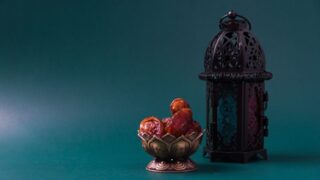Overeating…Ramadan…it sounds familiar, doesn’t it? Actually, many people compensate for the meal missed during the day at iftar because the body is deprived of food for a long period of time. However, overeating does not help; we usually eat more than what is needed to compensate. Our aim at iftar should be to eat only as much as we need to provide us with the energy necessary to do both our work and worship. This means we should eat in moderation.
The idea of moderation is an inherent part of Islam. Allah has provided us with helpful tips on how to moderate our behaviors and Prophet Mohammed (peace be upon him) implemented the concept of moderation to perfection. As mentioned in the Qur’an, (Eat and drink and be not immoderate. Verily Allah does not like the transgressors) (Al-A`raf 7:31). And (Eat of the good things We have provided for your sustenance, but commit no excess therein) (Taha 20:81).
It would be useful to keep another hadith of the Prophet Mohammed (peace be upon him) in mind this Ramadan: “No man fills a vessel worse than his stomach. A few mouthfuls that would suffice to keep his back upright are enough for a man. But if he must eat more, then he should fill one third (of his stomach) with food, one third with drink and leave one third for easy breathing” (Ahmad).
Here are some tips we can deduce from the Qur’anic verses above and the Prophet’s Hadith:
- Do not eat till complete satiety
Before you eat, make your intentions—niyah—that your iftar is an act of worship. Eating should be given the same attention as prayer. Thus it is also sunnah to perform ablution before you begin to eat.
Another niyah is eating to provide you with enough energy to perform your other acts of worship (praying, reading Qur`an etc). Overeating may result in the feeling of sluggishness, which could prevent you from performing your other acts of worship well.
- Start your meal by saying bismillah (in the name of Allah), and eat with your right hand. Take small bites and do not reach out for more food before you finish chewing what you have in your mouth. This is the sunnah of the Prophet (peace be upon him).
- Do not put more than you can eat on your plate because you are hungry, try to fill your plate only with the amount of food you know you will eat.
- You should only fill one third of your stomach with food and leave one third for fluids to compensate for the fluids lost during the day. Fluids can help good digestion. As the Prophet (peace be upon him) said, one “should fill one third (of his stomach) with food, one third with drink and leave one third for easy breathing.” Leaving a third of your stomach empty ‘for breath’ keeps you from overeating to the extent of not being able to breathe comfortably after finishing your meal.
- Remember, eating a lot at once may lead to distention and indigestion.
- Help digest the iftar by walking to the mosque you will pray in. Try also to increase the number of steps you take every day by 2000 steps. This is not a difficult number to achieve if you pray in a mosque that is a little further away every day. In addition, every step you take to the mosque increases your rewards, in sha`Allah.
The idea is moderation, not excess or deprivation. Depriving your body of food is just as detrimental. At the end, we wish you a healthy Ramadan.


















